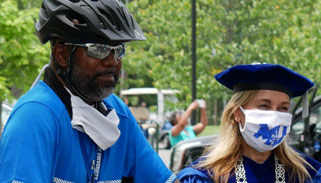Student Health and Well-being
The Student Health and Well-being team provides compassionate, inclusive, and empowering clinical and educational services that nurture students’ physical and emotional well-being. Student Health Services provides medical care for students. Student Counseling Services offers free individual and group counseling sessions to all enrolled students. The Office of Wellness, Prevention, and Education promotes health education and oversees our CARE Team, which supports students in distress. Our team includes licensed counselors, nurses, and health educators. Student Health and Well-being also oversees Title IX complaints, concerns, and programs; The Office of Student Conduct and Conflict Resolution; and works closely with the Bias Incident Response Team.
We are here to support every aspect of your well-being and hope you will take advantage of our services and programs!













